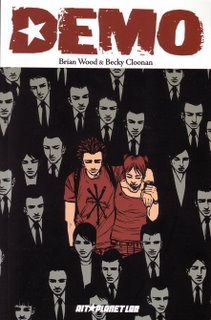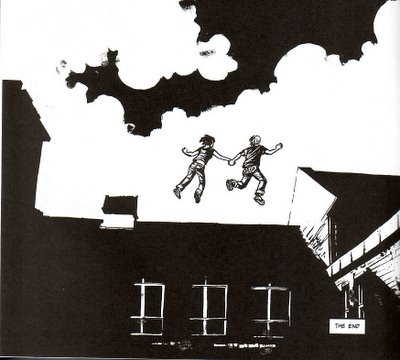Demo
 Yes - now that Jog has posted, I am officially the last in the (blessedly refunctioning) WeboComicsBlogoNet to comment on Demo. Undeterred, I press forward.
Yes - now that Jog has posted, I am officially the last in the (blessedly refunctioning) WeboComicsBlogoNet to comment on Demo. Undeterred, I press forward.
Picking up the Demo collection, the first thing that struck me was the format. This may be my new favorite format for squarebound collections. Though I love DC's oversized Absolute line ... they aren't exactly friendly, are they? And while the seemingly-standard tankobon excels at convenience, it's not all that comfortable to read and often seems to cramp the art. Demo is what a trade paperback should be: excellent paper, sturdy coverstock that's a tactile joy, and a size that's just large enough to let the art breathe and just small enough to be read in the lobby while your daughter's in ballet class. The collection also pulls an interesting trick when it practically ignores the monthlies where these stories were first published. There's no collection of covers, no commentary, no sketchbook: this is presented as an original work of art. Though it seems to be swimming upstream in this market patterned after the ever-increasing bloat of the DVD market, this slim, efficient collection feels like a book - not a comic. When I pick up a brilliant short story collection, I don't get reproductions of the original magazine covers, do I? Apart from small-print legalese, I seldom get any info about the original publication, because it's completely besides the point. I don't pick up a Raymond Carver collection because I care about the magazines that published the stories individually. I have no idea where "A Small, Good Thing" was first published, and I don't care: I'm interested in the writing and the story, and that's what I get. The Demo collection cleverly puts the emphasis back on the stories, not their original method of delivery.
Encountering the series in this format, ripped it from its origins as a monthly comic, also provides an interesting distance on Demo's supposed subject of "real-world superpowers". As I read the collection, superpeople and X-Persons were the farthest thing from my mind. Perhaps the comparisons come from Wood's comments, or from his earlier work in the Marvel Comics sandbox, or from the publishing medium itself that still immediately conjures images of superheroes ... but they fell away like so much marketing fluff as I read the book. Much like Scott Pilgrim, I feel Demo is simply an exercise in an American magical realism. Collect the teens from these twelve stories, send them off to fight Magneto or somesuch, and you'd have disaster on both the battlefield and the page. These are not rigidly defined sets of powers and costumes: the extranatural events and abilities of Demo exist only in the service of the story. This is angst, alienation, family, loneliness and the other terminal symptoms of life writ large ... not optic eyebeams.
"Mon Dernier Jour Avec Toi (My Last Night With You)", the twelfth and concluding issue of Demo is an almost-perfect microcosm of the series: heartfelt writing about the climactic moments of youth that is at times too-clever and too-cute by half, but that manages to escape preciousness through Wood's honesty and vulnerability and Cloonan's utterly inspired art. Wood wears his heart on his sleeve throughout the collection, but nowhere moreso than in this poem that is unafraid to be openly romantic and artistic. It's that fearlessness that makes the series work as he hops from style to style and story to story, and Becky Cloonan keeps up with him step for step - when she's not outpacing him. The final page (reproduced on the back cover) arrested me with it's precise ambiguity. Maybe it resonates so strongly with me because it reminds me of my favorite artwork from the 80's: Robert Longo's "Men In The Cities", which took a look at yuppie culture and never decided if they were dancing or dying. 20 years later, we have an equally ambiguous picture of young New Yorkers who are leaving the city - but are they flying or falling? It's that kind of poetry of image, that wonderful feeling of magic made real that sums up the series.

1 comment:
Nice job! You almost made me reconsider my harsh take on DEMO, especially that final chapter, which I loathed. Actually, I did reconsider, but didn't change my mind about it in the end. Nevertheless, methinks this qualifies as another greatest hit.
Post a Comment